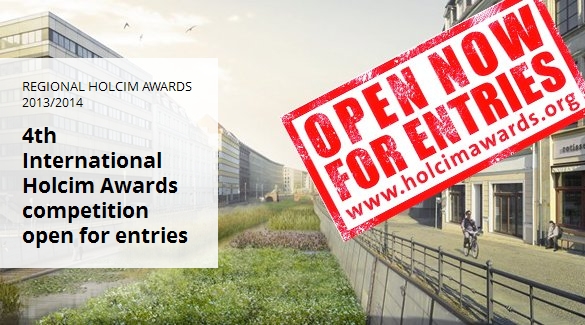Holcim Awards 2013/2014

The 4th International Holcim Awards competition celebrates projects and visions that contribute to a more sustainable built environment and features total prize money of USD 2 million.
The competition is open for projects in architecture, building and civil engineering, landscape and urban design, materials, products and construction technologies that contribute to the five ŌĆ£target issuesŌĆØ for sustainable construction. The competition has two categories with different requirements.
Holcim Awards (main category)
Project has reached an advanced stage of design with high probability of execution
Execution of the project may not have started before July 1, 2013
All authors must be at least 18 years of age (date of birth March 24, 1996 or earlier)
“Next Generation” (young professionals and students category)
Visionary projects and bold ideas
All authors must be between 18 and 30 years of age (date of birth between July 2, 1982 and March 24, 1996)
Execution of the project may not have started before July 1, 2013
Evaluation process
Renowned technical universities lead the independent juries in five regions of the world. They evaluate entries against the ŌĆ£target issuesŌĆØ for sustainable construction.
“Target issues” for sustainable construction
Living up to the five ŌĆ£target issuesŌĆØ defined by the Holcim Foundation to quantify the degree to which buildings contribute to sustainable development: The Minimal Impact North Vancouver Outdoor School is completely self-reliant and CO2-neutral. Elevated on a structural platform offering spectacular views and access to nature, the buildingŌĆÖs placement also offers protection against future flood concerns.
A framework for sustainable construction
The Holcim Foundation for Sustainable Construction is committed to the ŌĆ£triple bottom lineŌĆØ concept, which asserts that long-term and sustainable progress requires the balanced achievement of economic development, environmental performance and social advancement.
Based on this concept and to make sustainable construction easier to understand, evaluate and apply, the Holcim Foundation and its renowned partner universities have identified a set of five ŌĆ£target issuesŌĆØ for sustainable construction, which serve as a basis for the evaluation of submissions in the Holcim Awards competition and for assessing other projects in the context of publications on exemplary sustainable construction buildings.
Innovation and transferability ŌĆō Progress
Ethical standards and social equity ŌĆō People
Environmental quality and resource efficiency ŌĆō Planet
Economic performance and compatibility ŌĆō Prosperity
Contextual and aesthetic impact ŌĆō Proficiency
